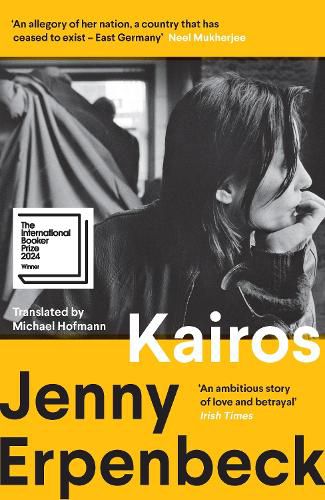Readings Newsletter
Become a Readings Member to make your shopping experience even easier.
Sign in or sign up for free!
You’re not far away from qualifying for FREE standard shipping within Australia
You’ve qualified for FREE standard shipping within Australia
The cart is loading…






Winner of the 2024 International Booker Prize
Berlin. 11 July 1986. They meet by chance on a bus. She is a young student, he is older and married. Theirs is an intense and sudden attraction, fuelled by a shared passion for music and art, and heightened by the secrecy they must maintain. But when she strays for a single night he cannot forgive her and a dangerous crack forms between them, opening up a space for cruelty, punishment and the exertion of power. And the world around them is changing too: as the GDR begins to crumble, so too do all the old certainties and the old loyalties, ushering in a new era whose great gains also involve profound loss.
From a prize-winning German writer, this is the intimate and devastating story of the path of two lovers through the ruins of a relationship, set against the backdrop of a seismic period in European history.
$9.00 standard shipping within Australia
FREE standard shipping within Australia for orders over $100.00
Express & International shipping calculated at checkout
Winner of the 2024 International Booker Prize
Berlin. 11 July 1986. They meet by chance on a bus. She is a young student, he is older and married. Theirs is an intense and sudden attraction, fuelled by a shared passion for music and art, and heightened by the secrecy they must maintain. But when she strays for a single night he cannot forgive her and a dangerous crack forms between them, opening up a space for cruelty, punishment and the exertion of power. And the world around them is changing too: as the GDR begins to crumble, so too do all the old certainties and the old loyalties, ushering in a new era whose great gains also involve profound loss.
From a prize-winning German writer, this is the intimate and devastating story of the path of two lovers through the ruins of a relationship, set against the backdrop of a seismic period in European history.
The title of Jenny Erpenbeck’s fourth novel refers to a tenet of ancient Greek philosophy – the idea of the right or critical moment to act. Just how kairos impacts the novel’s two major characters becomes clear in its final gut-punch revelations. But before then, Erpenbeck recreates, in both earthy and erudite detail, the rhythms and smells of life in the German Democratic Republic in its final days.
Katharina, a 19-year-old student, is running late for her East Berlin bus. It’s July 11, 1986. In three years, the Berlin Wall will fall. Germany will begin the road to reunification. Inside the bus, Katharina locks eyes with Hans, a married 53-year-old writer and freelance radio presenter. A moment presents itself. They seize it. A coffee, then to his apartment. They listen to Mozart, make love, their relationship unfolding from here as a symbiotic one, rendered with near claustrophobic precision by Erpenbeck in an impeccable translation by the poet, Michael Hofmann.
At first, Katharina is spellbound by the things Hans exposes her to. Their connection is physical and psychological, a relationship between two generations and two Germanys. When their love twists and darkens, Katharina mostly surrenders to Hans’s interrogations, surveillance, and control. There is no sentimentality here, only contradiction and human frailty, in a relationship that is part allegory for the fate of the GDR itself. Kairos reminds us that when East Germany dissolved, an entire country disappeared, replaced with a new one many were ill-equipped to live in. Erpenbeck, born there in 1967, approaches these broken bonds and power shifts with sophistication, fierce intelligence and emotional complexity.
Late in the novel, there is a gorgeous melancholy to the way Katharina revisits all the places she had been with Hans – the traces of their intimate history layered over this new geopolitical order. The personal and the political glued together with the blood of history. Kairos is a serious, grown-up, very moving novel. We’ve hit the halfway mark of 2023, and I think I’ve just read the book of the year.
See what the Readings’ team have to say on the blog, discover related events and podcast episodes.
We've run the reports and crunched the numbers. Here are our 100 bestselling books for 2024!
Discover these critically acclaimed works of fiction, nonfiction and poetry that have received accolades in Australia and beyond.
Works from women writers from around the globe, now available in English translation.